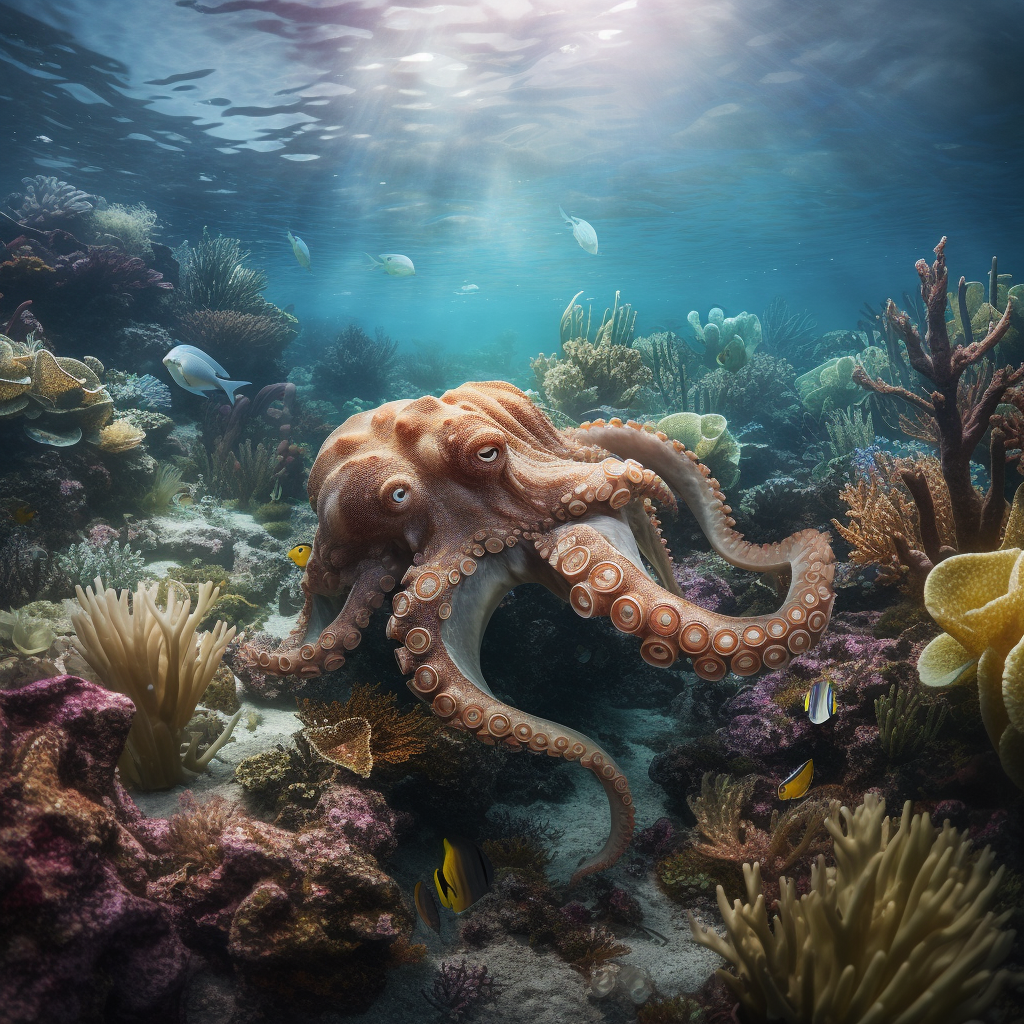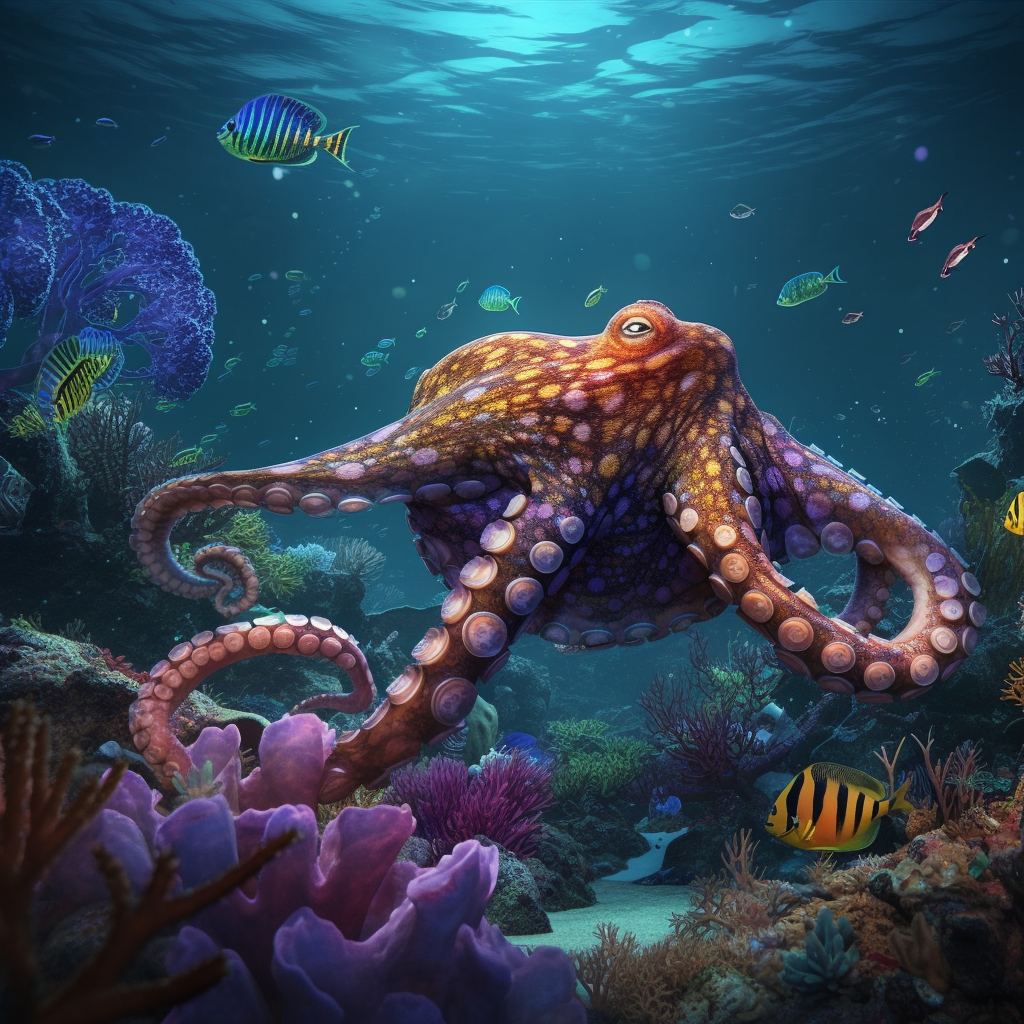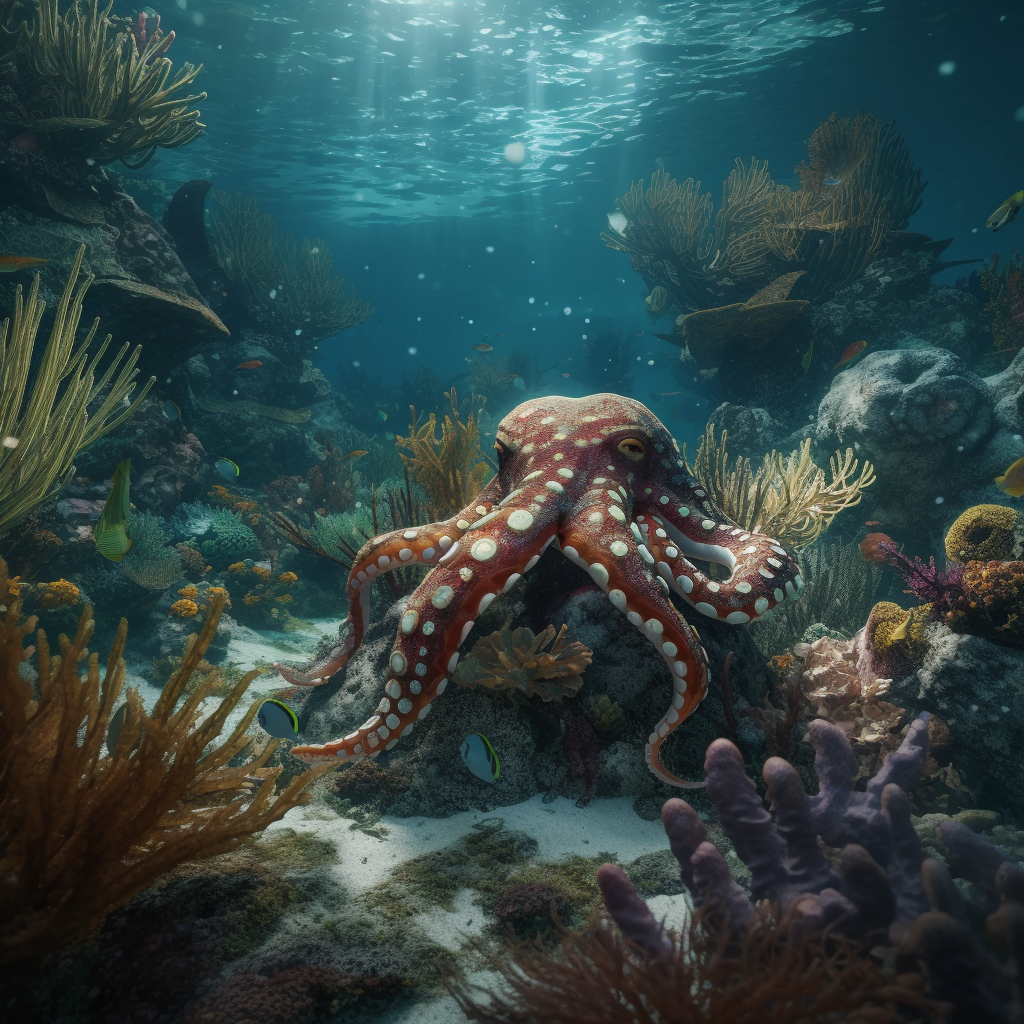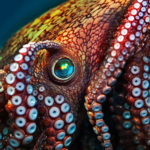Octopuses, often regarded as mysterious and intelligent creatures, play a vital role in maintaining the balance of marine ecosystems. These fascinating creatures, belonging to the cephalopod family, contribute to the environment in various ways. From controlling populations of prey species to providing food for other marine animals, octopuses have a significant impact on the overall health and biodiversity of our oceans. In this article, we will explore the different ways in which octopuses help the environment and why their conservation is crucial for the well-being of our planet. So, let’s dive in and discover the incredible contributions of these remarkable creatures.
Key Takeaways
- Octopuses play a crucial role in maintaining the balance of marine ecosystems.
- Their feeding habits help control the population of prey species, preventing overpopulation.
- Octopuses are skilled hunters and help maintain the health of coral reefs by controlling the population of herbivorous fish.
- Their ability to camouflage and hide helps them avoid predators, contributing to the overall stability of the food chain.
- Octopuses are indicators of environmental health, and their presence or absence can indicate the condition of their habitat.
The Octopus: An Overview
A. Understanding the Octopus: Abilities and Adaptations
Octopuses are fascinating creatures that inhabit the world’s oceans. With their unique abilities and adaptations, they play a crucial role in maintaining the delicate balance of marine ecosystems. Let’s take a closer look at some of the remarkable characteristics of these intelligent creatures.
-
Camouflage: One of the most impressive abilities of octopuses is their remarkable camouflage skills. They can change the color and texture of their skin to blend seamlessly with their surroundings, allowing them to hide from predators and ambush their prey. This incredible adaptation helps them survive in their diverse habitats, ranging from coral reefs to rocky seabeds.
-
Problem-solving: Octopuses are known for their exceptional problem-solving skills. They have a highly developed nervous system and a complex brain, allowing them to learn and adapt to new situations quickly. They can use tools, solve puzzles, and even escape from enclosures, showcasing their remarkable intelligence.
-
Predator and Prey: Octopuses are both predators and prey in the marine food chain. As predators, they help control the population of various marine species, ensuring a balanced ecosystem. They feed on a wide range of prey, including fish, crustaceans, and mollusks, playing a crucial role in maintaining the diversity of marine life.
-
Environmental Adaptation: Octopuses have evolved to adapt to different environmental conditions. They can thrive in various habitats, from shallow coastal waters to the deep sea. Their ability to adjust their behavior and physiology to changing environmental factors makes them resilient in the face of challenges such as climate change and habitat degradation.
B. The Octopus Habitat: Survival and Adaptation
Octopuses inhabit a wide range of habitats, each with its unique set of challenges and opportunities. Understanding their habitat is essential for comprehending their role in the environment and the benefits they provide.
-
Coral Reefs: Coral reefs are one of the most diverse ecosystems on the planet, and octopuses play a vital role in maintaining their health. They help control the population of herbivorous species like sea urchins, preventing overgrazing on coral reefs. By keeping the herbivore population in check, octopuses indirectly contribute to the overall balance and sustainability of coral reef ecosystems.
-
Seafloor Health: Octopuses are bottom-dwelling creatures, often found in rocky crevices or burrows on the seafloor. Their presence helps maintain the health of the seafloor by controlling the population of mollusks and other benthic organisms. By preying on these organisms, octopuses prevent overpopulation and ensure a balanced ecosystem.
-
Marine Biodiversity: Octopuses are an integral part of marine biodiversity. Their diverse species contribute to the overall richness and complexity of marine ecosystems. Their presence ensures a healthy and thriving underwater world, where different species interact and depend on each other for survival.
-
Oceanic Environmental Balance: Octopuses, with their predatory nature, help regulate the population of various marine organisms. By controlling the abundance of certain species, they prevent imbalances in the food chain and maintain the overall health of the oceanic environment.
In conclusion, octopuses are remarkable creatures that contribute to the well-being of the environment in numerous ways. Their abilities and adaptations, along with their role in maintaining the balance of marine ecosystems, make them an essential part of our oceans. Understanding and appreciating these fascinating creatures is crucial for their conservation and the preservation of our planet‘s biodiversity.
The Role of Octopuses in the Environment
A. Maintaining the Balance: How Octopuses Contribute to Ecosystem Health
Octopuses, with their unique characteristics and behaviors, play a crucial role in maintaining the delicate balance of marine ecosystems. These intelligent creatures have a significant impact on the health and sustainability of the oceans they inhabit.
1. Prey-Predator Balance
Octopuses are skilled predators, and their presence helps regulate the population of various marine species. By preying on smaller organisms like crabs, clams, and fish, octopuses prevent these populations from becoming too large and overwhelming their respective habitats. This control over prey populations ensures that the ecosystem remains in balance, preventing any single species from dominating and disrupting the natural order.
2. Nutrient Cycling
As octopuses consume their prey, they release nutrients back into the environment through their waste. These nutrients, such as nitrogen and phosphorus, are essential for the growth of marine plants and algae. By facilitating nutrient cycling, octopuses indirectly contribute to the overall health and productivity of the ocean ecosystem.
3. Camouflage and Adaptation
Octopuses are masters of camouflage, capable of changing both their color and texture to blend seamlessly with their surroundings. This ability not only helps them evade predators but also allows them to sneak up on unsuspecting prey. By maintaining a healthy population of octopuses, we ensure that this unique adaptation remains intact, contributing to the overall biodiversity and ecological balance of the ocean.
B. The Octopus and Biodiversity: A Symbiotic Relationship
Octopuses are an integral part of marine biodiversity, playing a vital role in the intricate web of life that exists in our oceans. Their presence and interactions with other species have far-reaching effects on the overall health and diversity of marine ecosystems.
1. Marine Food Chain
As predators, octopuses occupy a significant position in the marine food chain. They serve as a link between lower trophic levels, such as small invertebrates, and higher trophic levels, including larger fish and marine mammals. Their ability to control the population of prey species helps maintain a diverse range of organisms throughout the food chain, ensuring the stability and resilience of the ecosystem.
2. Habitat Engineering
Octopuses are known to modify their surroundings to create shelters and dens. These structures provide refuge not only for the octopuses themselves but also for a variety of other marine organisms. By creating complex habitats, octopuses contribute to the overall biodiversity of the ocean, providing homes for countless species and fostering the growth of coral reefs and other delicate ecosystems.
3. Climate Change Resilience
With the increasing impact of climate change on our oceans, the role of octopuses becomes even more crucial. These adaptable creatures have the ability to adjust to changing environmental conditions, making them resilient in the face of rising temperatures and ocean acidification. By studying their breeding habits, researchers can gain valuable insights into how marine life can adapt and survive in a changing world.
In conclusion, octopuses are not only fascinating creatures but also essential contributors to the health and balance of our oceans. Their role in maintaining the prey-predator balance, nutrient cycling, and biodiversity highlights the importance of protecting and conserving these remarkable animals. By understanding and appreciating the environmental benefits of octopuses, we can work towards creating a sustainable future for our oceans and all the life they support.
The Octopus: An Environmental Benefactor
A. Octopuses and Waste Management: A Natural Cycle
Octopuses, with their remarkable abilities and unique characteristics, play a crucial role in maintaining the delicate balance of the oceanic ecosystem. While they may not be the first creatures that come to mind when thinking about waste management, octopuses actually contribute to the natural cycle of the environment in their own way.
-
Octopus Diet Impact: Octopuses have a diverse diet that includes a variety of marine organisms such as crabs, fish, and mollusks. By preying on these animals, octopuses help control their populations, preventing them from becoming too abundant and potentially causing imbalances in the ecosystem.
-
Prey-Predator Balance: As predators, octopuses help regulate the population of their prey species. By keeping the numbers of certain marine organisms in check, octopuses ensure that the delicate balance of the ocean is maintained.
-
Mollusk Population Control: Octopuses have a particular affinity for mollusks, such as clams and snails. By feeding on these creatures, octopuses help control their population, preventing them from overwhelming their habitats and damaging the seafloor.
-
Octopus and Coral Reefs: Coral reefs are vital ecosystems that support a wide range of marine life. Octopuses play a role in maintaining the health of coral reefs by controlling the population of organisms that may harm the corals. This helps ensure the longevity and sustainability of these important habitats.
B. The Blue-Ringed Octopus: A Unique Environmental Contributor
One of the most fascinating octopus species is the blue-ringed octopus. While it may be small in size, this creature has a significant impact on the environment.
-
Octopus Camouflage: The blue-ringed octopus is known for its stunning ability to change color and blend seamlessly into its surroundings. This camouflage not only helps the octopus avoid predators but also allows it to sneak up on its prey. By keeping the population of certain marine organisms in check, the blue-ringed octopus helps maintain the balance of the marine food chain.
-
Octopus Environmental Adaptation: Octopuses, including the blue-ringed octopus, have evolved over millions of years to adapt to their environments. Their ability to thrive in various habitats, from coral reefs to rocky shores, contributes to the overall health and diversity of marine ecosystems.
-
Sustainable Octopus Fishing: Octopuses are a valuable resource for many coastal communities around the world. However, it is important to ensure that octopus fishing practices are sustainable to prevent overfishing and maintain the population of these creatures. By implementing responsible fishing methods, we can continue to benefit from the environmental contributions of octopuses without causing harm to their populations.
-
Octopus and Ocean Conservation: Understanding the role of octopuses in the environment is crucial for effective ocean conservation efforts. By recognizing the importance of octopuses in maintaining the health and balance of marine ecosystems, we can work towards protecting their habitats and ensuring their survival for future generations.
In conclusion, octopuses, including the blue-ringed octopus, are not only fascinating creatures but also important contributors to the environment. Through their role in waste management, population control, and environmental adaptation, octopuses help maintain the delicate balance of the oceanic ecosystem. By understanding and appreciating their contributions, we can work towards preserving their habitats and ensuring the long-term health of our oceans.
The Importance of Octopuses to the Environment

A. Why Octopuses are Vital to Ocean Ecosystems
Octopuses play a crucial role in maintaining the delicate balance of our ocean ecosystems. These intelligent creatures have a significant impact on the overall health of the environment, making them an essential part of marine biodiversity.
One of the key reasons why octopuses are vital to ocean ecosystems is their ability to control the population of other marine species. As skilled predators, octopuses help keep the population of various marine organisms in check. By preying on animals like crabs, fish, and mollusks, they prevent these populations from becoming too large and ensure the overall stability of the ecosystem.
Octopuses also contribute to the health of the ocean by controlling the spread of certain plant species, such as algae. Some types of algae can grow rapidly and overtake coral reefs or other marine habitats, causing harm to other organisms. Octopuses feed on these algae, helping to keep their population in check and maintaining the delicate balance of the underwater world.
B. The Impact of Octopuses on Environmental Health
The impact of octopuses on environmental health extends beyond population control. These fascinating creatures possess incredible abilities that enable them to adapt to their surroundings and contribute to the overall well-being of the ocean.
One remarkable characteristic of octopuses is their ability to change color and camouflage themselves. This unique adaptation allows them to blend seamlessly into their surroundings, making them excellent predators and ensuring their survival. By preying on other marine animals, octopuses help maintain a healthy prey-predator balance, preventing any one species from dominating the ecosystem.
Octopuses also have a significant impact on the health of coral reefs. These vibrant underwater ecosystems are home to a diverse range of marine life, and octopuses play a crucial role in their preservation. By controlling the population of herbivorous fish that feed on coral, octopuses help protect these delicate structures and ensure the long-term health of coral reefs.
Furthermore, octopuses contribute to the overall health of the seafloor. As they move and forage for food, they disturb the sediment, promoting nutrient circulation and preventing the buildup of organic matter. This disturbance helps maintain a healthy balance in the seafloor ecosystem, benefiting other organisms that rely on it for survival.
In conclusion, octopuses are not only fascinating creatures but also vital contributors to the health and balance of our ocean ecosystems. Their role in controlling populations, maintaining the prey-predator balance, preserving coral reefs, and promoting seafloor health is crucial for the overall well-being of marine life. Understanding and protecting these remarkable creatures is essential for the conservation and sustainability of our oceans.
The Octopus and Its Kin: A Comparative Analysis

A. Squids and the Environment: A Parallel to Octopuses
When discussing the role of octopuses in the environment, it is essential to consider their close relatives, the squids. Both octopuses and squids belong to the class Cephalopoda, and they share many similarities in terms of their ecological impact.
Squids, like octopuses, play a crucial role in maintaining the delicate balance of marine ecosystems. They are both predators and prey, which allows them to influence the populations of other marine organisms. By keeping the populations of certain species in check, squids help ensure the overall health and stability of the ocean environment.
One of the ways squids contribute to the environment is through their diet. They primarily feed on small fish and crustaceans, acting as a natural predator that helps control their populations. This predation helps prevent any one species from becoming too dominant and disrupting the delicate balance of the marine food chain.
Additionally, squids have the ability to change their color and camouflage themselves, allowing them to blend seamlessly into their surroundings. This adaptation helps them avoid predators and increases their chances of successfully hunting their prey. By maintaining a healthy population of squids, we can help ensure the survival of other marine species that rely on them for food.
B. The Benefits of Being an Octopus: A Thematic Exploration
Octopuses, on the other hand, have their own unique set of characteristics that contribute to the environment. Their ability to adapt and thrive in various habitats makes them an important part of the marine ecosystem. Let’s explore some of the benefits of having octopuses in the environment:
-
Mollusk Population Control: Octopuses have a particular fondness for mollusks, such as clams and snails. By preying on these creatures, octopuses help control their population and prevent them from overwhelming their habitats. This balance is crucial for maintaining the health of coral reefs and other marine ecosystems.
-
Seafloor Health: Octopuses are known for their exceptional hunting skills and intelligence. They use their tentacles to search for prey, often digging into the seafloor to find hidden organisms. This behavior helps aerate the sediment and prevent it from becoming stagnant, promoting a healthier seafloor environment.
-
Environmental Adaptation: Octopuses have the remarkable ability to adapt to changing environmental conditions. They can adjust their behavior, diet, and even their coloration to match their surroundings. This adaptability allows them to thrive in different habitats and ensures their survival even in the face of environmental changes.
-
Marine Life Interaction: Octopuses are highly interactive creatures, engaging with their environment and other marine species. They are known to play and explore their surroundings, which contributes to the overall biodiversity and richness of the marine ecosystem. Their interactions with other species, such as fish and crustaceans, create a dynamic and thriving underwater world.
-
Ocean Conservation: Understanding the role of octopuses in the environment is crucial for effective ocean conservation. By recognizing their importance and implementing sustainable fishing practices, we can ensure the long-term survival of octopuses and the health of our oceans. Protecting their habitats, such as coral reefs and seafloors, is also essential for maintaining a balanced and thriving marine ecosystem.
In conclusion, octopuses and their relatives, the squids, play vital roles in maintaining the health and balance of the marine environment. Their predatory nature, adaptability, and interactions with other species contribute to the overall biodiversity and stability of the ocean ecosystem. Recognizing and appreciating the environmental benefits of these fascinating creatures is crucial for their conservation and the preservation of our oceans.
The Octopus: A Model for Environmental Balance

A. How Octopuses Promote Environmental Equilibrium
Octopuses, with their fascinating abilities and unique characteristics, play a crucial role in maintaining environmental balance in the ocean. These intelligent creatures have a significant impact on the marine ecosystem, ensuring the overall health and sustainability of the oceanic environment.
1. Controlling Prey-Predator Balance
Octopuses are skilled predators, known for their ability to adapt and camouflage themselves in various underwater environments. Their exceptional hunting skills help regulate the population of their prey, such as mollusks and crustaceans. By keeping these populations in check, octopuses prevent overconsumption of resources and maintain a delicate balance within the marine food chain.
2. Enhancing Marine Biodiversity
Octopuses contribute to the diversity of marine life by occupying various niches within the ocean ecosystem. With over 300 known species, they display a wide range of adaptations and behaviors. This diversity is essential for the overall health and resilience of the marine environment, as it ensures the presence of different ecological roles and functions.
3. Supporting Coral Reefs and Seafloor Health
Octopuses also play a vital role in maintaining the health of coral reefs and seafloors. Some species of octopuses are known to inhabit coral reefs, where they help control populations of organisms that could harm the reef ecosystem. Additionally, their foraging activities on the seafloor help to aerate and stir up sediment, promoting nutrient cycling and maintaining a healthy balance of organic matter.
B. The Octopus: A Symbol of Environmental Resilience
Octopuses are not only fascinating creatures but also symbols of environmental resilience. Their unique characteristics and adaptive abilities make them a testament to the incredible diversity and adaptability of life in the ocean.
1. Camouflage and Adaptation
One of the most remarkable features of octopuses is their ability to change color and texture, allowing them to blend seamlessly into their surroundings. This camouflage not only helps them avoid predators but also enables them to become efficient predators themselves. Their adaptability and camouflage skills showcase the incredible ways in which marine creatures have evolved to survive in their environments.
2. Breeding Habits and Life Cycle
Octopuses have complex breeding habits and life cycles, which contribute to their resilience as a species. Most octopuses have a short lifespan, with females investing a significant amount of energy into reproduction. They lay a large number of eggs, which they carefully guard and protect until hatching. This reproductive strategy ensures the survival of their offspring and contributes to the overall population stability.
3. Climate Change and Conservation
As the world faces the challenges of climate change, the importance of ocean conservation becomes increasingly evident. Octopuses, with their ability to adapt to changing environments, serve as a reminder of the resilience and adaptability of marine life. Understanding their behavior and ecological role can help in developing effective conservation strategies to protect not only octopuses but also the entire marine ecosystem.
In conclusion, octopuses are remarkable creatures that contribute significantly to the environmental balance of the ocean. Their role in controlling prey-predator balance, enhancing marine biodiversity, supporting coral reefs and seafloor health, as well as their adaptability and resilience, make them a vital part of the marine ecosystem. By understanding and appreciating the importance of octopuses, we can work towards ensuring the long-term health and sustainability of our oceans. Conclusion
In conclusion, octopuses play a crucial role in maintaining the balance of marine ecosystems and helping the environment in various ways. Their ability to camouflage themselves and change colors helps them avoid predators and hunt for prey effectively. Octopuses also contribute to the health of coral reefs by controlling the population of organisms that can harm the corals. Their feeding habits help to prevent overpopulation of certain species, ensuring a balanced ecosystem. Additionally, octopuses are known to create intricate dens and burrows, which provide shelter for other marine creatures. Their intelligence and problem-solving skills make them fascinating creatures to study and admire. Overall, octopuses are not only important for the marine environment but also serve as a reminder of the incredible diversity and complexity of life on our planet.
Frequently Asked Questions
How do octopus get rid of waste?
Octopuses, like other marine creatures, have a specialized excretory system. They expel waste products, primarily ammonia, through a tube called the siphon. This process helps maintain the balance of substances in their bodies and contributes to the overall health of the ocean.
How does octopus help the environment?
Octopuses play a crucial role in the marine ecosystem. They are part of the marine food chain, serving as both predator and prey, thus contributing to the prey-predator balance. Their diet impacts the mollusk population control. Octopuses also promote marine biodiversity due to their species diversity.
What is the theme of the benefits of being an octopus?
The theme of ‘The Benefits of Being an Octopus‘ is not directly related to the environmental benefits of octopuses. However, octopuses in general contribute to ocean health through their role in the ecosystem, including their diet impact and their part in maintaining the marine food chain.
How does the blue-ringed octopus help the environment?
The blue-ringed octopus, like other octopus species, contributes to marine biodiversity and helps maintain the balance in the oceanic environment. They control the population of their prey and serve as food for larger predators, thus playing a key role in the marine food chain.
How do squids help the environment?
Squids, similar to octopuses, play a significant role in the marine ecosystem. They are an important link in the marine food chain, serving as both predator and prey. They also contribute to the balance of marine biodiversity and help maintain the health of the seafloor and coral reefs.
How do octopus adapt to their environment?
Octopuses have a remarkable ability to adapt to their environment. They can change their color and texture to blend in with their surroundings, a phenomenon known as octopus camouflage. This ability helps them evade predators and sneak up on prey, contributing to the balance of the marine ecosystem.
Why are octopuses important to the environment?
Octopuses are important to the environment due to their role in the marine ecosystem. They contribute to marine biodiversity, help maintain the prey-predator balance, and their diet impacts the mollusk population control. They also play a role in seafloor health and coral reef ecosystems.
What do octopus need to survive?
Octopuses need a healthy marine environment to survive. This includes access to food, suitable habitat, and the ability to breed. Their survival is also linked to the overall health of the ocean, highlighting the importance of ocean conservation and sustainable fishing practices.
How do octopuses help the environment?
Octopuses help the environment by contributing to marine biodiversity, maintaining the prey-predator balance, and controlling the mollusk population through their diet. They also play a role in maintaining the health of the seafloor and coral reefs.
How do octopus affect the environment?
Octopuses affect the environment in several ways. They contribute to marine biodiversity, maintain the prey-predator balance, and their diet impacts the mollusk population control. They also play a role in maintaining the health of the seafloor and coral reefs. Their presence or absence can indicate the health of the marine environment.




